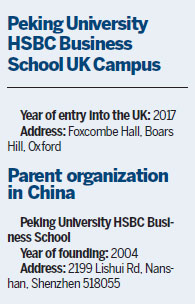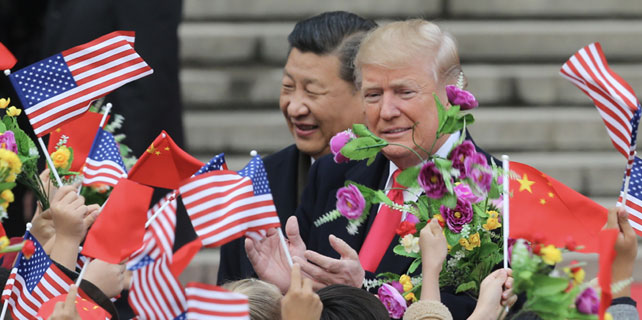Building an academic bridge
Peking University's HSBC Business School to open campus in UK next year to give globalization a boost
China's Peking University will open a campus next year not far from the English city of Oxford, home to the UK's first university, to provide education and to serve as a bridge between China and the world.
Earlier this year, Peking University HSBC Business School bought the former Open University campus in Boar's Hill for around £8.8 million ($11.5 million; 10 million euros). The school is preparing new programs for its first UK intake of students in 2018.
"Our university's globalization strategy is a reflection of China's increasing integration into the global economy," says Hai Wen, dean of Peking University's HSBC Business School. "I am very confident that our students will contribute significantly to the process of China's globalization."
|
Chinese and foreign students study together at Peking University HSBC Business School's classrooms in Shenzhen. Provided to China Daily |
Hai adds: "As China's economy integrates with the global economy, we as universities also play a crucial role in attracting the world's best talent to China, so that they may stay in China either for their career development or for running their own business."
The heart of the campus, 8 kilometers from the Oxford city center, will be Foxcombe Hall, a 19th-century manor that was home to the eighth earl of Berkeley.
Peking University was founded in 1898 in what is now known as Beijing, and its HSBC Business School was founded in Shenzen in 2004.
Hai still remembers the excitement and challenge when the business school began. The excitement arose from the opportunity to build a new institution on the back of Peking University's strong heritage, and to build partnerships with businesses in China's tech hub, Shenzhen.

But the challenge was how to build a well-recognized business school, given that Peking University already has the prestigious Guanghua School of Management, which was founded in Beijing in 1985 and hosts thousands of students.
Hai's answer was to differentiate his school through an emphasis on corporate collaboration and international perspective.
"Shenzhen has a vibrant business and finance community, but the education sector there was lagging behind Beijing and Shanghai," Hai says.
"We were established not only to support the growth of Shenzhen business, but also to embrace opportunities brought by the city - namely the huge momentum of reform and innovation for the knowledge creation needed in education and academic research."
The school quickly grew. It now hosts several hundred full-time students and an additional 1,000 to 2,000 part-time executive development program students.
The quality of the school's teaching is hard to measure objectively, since it does not participate in any ranking tables. Hai says that is a conscious choice taken by the school, because its relatively short history and small alumni base mean its merits are not fairly captured by ranking table assessments.
But the school is popular: Around 1,700 applicants compete for its 300 places in master's degree classes in economics, finance, management or financial media.
Currently, 40 percent of its approximately 70 faculty members are foreigners, as are 15 percent of its master's students. All of its full-time courses are taught in English.
Given the school's strong emphasis on international growth, expanding into the UK market was natural, says Hai. Initially, his team ventured into the United Kingdom to explore how to increase student recruitment from this market, but discovered that the Open University was selling its Oxford campus.
Since the purchase, his team is focusing on a process of refurbishment, such as enlarging some classrooms, adding classroom space and upgrading teaching facilities. In the coming year, it will also create a guest house for hosting visiting teachers and building accommodation to enable students to live on campus.
The school will also tidy up the 60,000 square meters of woods and gardens. "We will turn it into a relaxing woodland for students to enjoy the beauty of nature," he says.
Hai says the UK campus serves two main purposes: educating students in a global environment and strengthening cooperation with international partner universities and organizations. Chinese students at its Shenzhen campus can visit the Oxford campus for their studying-abroad experience.
Meanwhile, UK-recruited students will spend the first year of their international programs at the Oxford campus, where they will acquire fundamental academic knowledge for their degree programs, and learn about Chinese language and culture, to better prepare them for their study in China.

Hai says the school hopes to recruit 50 to 100 students for 2018 who will study for master's degrees in finance or management. "Once they arrive in China in their second year, they will be doing more hands-on work, such as visiting companies and learning about how business school theories apply to the China context, through studying and discussing case studies that our professors have created."
The UK campus will also be key to creating links with international partners, in the form of seminars, lectures, events, student exchanges, case studies and research work, Hai adds.
Peking University HSBC Business School's UK expansion comes at a time when many international universities are establishing branches in China to familiarize students with China as the country emerges as a global power.
According to 2016 data from the Observatory on Borderless Higher Education, China ranked as the top hosting country for universities' international branches. Examples of business schools that have branches in China include Hult International Business School and the University of British Columbia Sauder School of Business, which have campuses in Shanghai.
Meanwhile, many Chinese business schools are also becoming increasingly international in their practices and vision. The Shanghai-based China Europe International Business School is now teaching its MBA degree in English, and 33.5 percent of its students are non-Chinese.
Hai says Peking University's HSBC Business School looks to produce graduates equipped to work in multinationals with a focus in China or to work for Chinese corporations with an international outlook.
"China's economy is becoming increasingly important globally. China is exercising international leadership, through initiatives such as the Belt and Road Initiative, and through a growing leadership role in multinational organizations such as the WTO and IMF.
"As China's economy may overtake the United States in 10 to 20 years, talent will increasingly want to come to China to study, and Chinese universities will become some of the best in the world," he says.
cecily.liu@mail.chinadailyuk.com
(China Daily European Weekly 11/10/2017 page30)



















